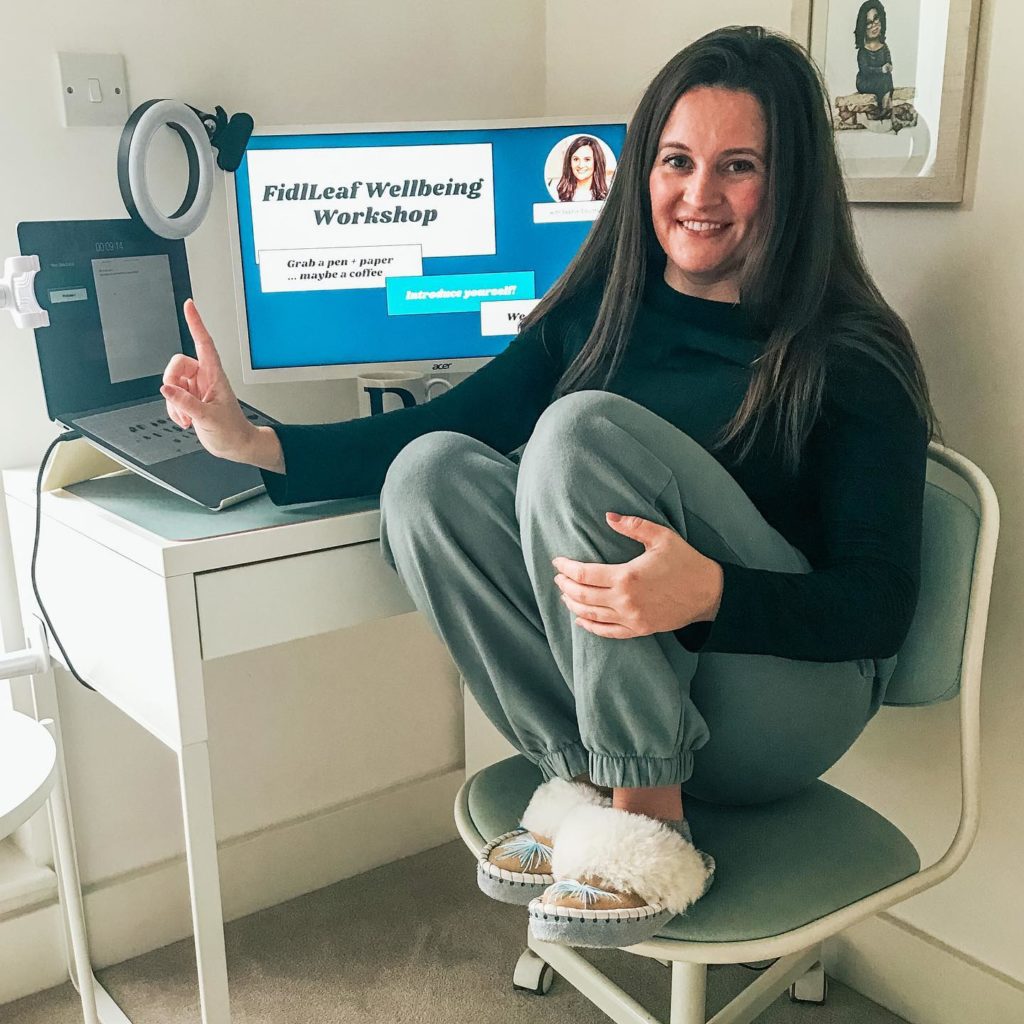Words by Sophie Coulthard, founder of Fidleaf.
Think back to when you first started your business. You knew it would be hard work, but you possibly also looked forward to the flexibility and freedom that working for yourself would offer. Maybe you’d be able to go to that lunchtime gym class you never could attend before. Or take Friday afternoons off to sip rosé with friends. Book into a cute AirBNB in the New Forest to work on something creative and get some quality fresh air.
Honestly, have you had the time to do any of those things since working for yourself? The chances are you’ve got a never-ending to do list, spend most evenings on your laptop on the sofa and the lunchtime gym class? Never happens!
We imagine that working for ourselves will bring about better work life balance, but the reality is that when you are the boss, your wellbeing often gets pushed down the agenda.
Why wellbeing is important for entrepreneurs and freelancers
You owe it to yourself to prioritise your wellbeing. Your wellbeing will power your work performance, so the more effort that you put into it, the more you will get out of work and life. Our research at FidlLeaf shows that when people don’t look after themselves and are stressed or run down it slows down problem solving ability and strategic thinking, drains creative thinking and makes people less intuitive, yet all of these things are pretty critical for success!
There is a fantastic book called Rest by Alex Soojung-Kim Pang that dispels the myth that the harder we work the better the outcome. Deliberate rest and taking time for yourself to fulfil yourself outside of work actually helps to make you more productive, have sharper ideas and more energy.
Companies are starting to realise this and are putting wellbeing policies in place or creating wellbeing champions to drive a culture change where wellbeing is encouraged and emphasised. Their policies might include an email ban outside of working hours to give employees time to switch off, and walking meetings so that everyone can brainstorm and get fresh air at the same time. There’s no reason why these policies can’t be pinched and adapted for solo workers, and it’s worth spending some time carving out a wellbeing policy-of-sorts for yourself.

Building a framework around wellbeing
It might sound a bit silly to write an entire wellbeing policy for one person, but even just a few bullet points on paper with some simple commitments, like taking an afternoon a week to work from a coffee shop to break out of the isolation of the home office might be a positive move for your wellbeing.
At FidlLeaf, we created a workplace wellbeing guide that focuses on four areas that were found in research from A Great Place To Work to be the key drivers of wellbeing in the workplace. I like to use those as the foundation for any wellbeing policy and think that they could easily be adapted for someone who works alone or runs their own business.
They are:
1. Values Aligned Behaviour
Good companies have strong values that are sewn through the culture of the organisation and their employees will have a strong alignment with those values.
For yourself, it’s worth thinking about your values, but also what you value spending your time on. What parts of your work light you up and inspire you? What could you potentially delegate or spend less time on? As well as this, are you able to work on projects or with clients that fit with your values? It can be difficult when first starting out as you may have to say yes to any work opportunity, but at some point you may be able to start to refine your ideal client or type of work.
Values aligned behaviour can go even further and become part of your pricing structure, marketing and sales strategy. It’s about what feels good for you and it may take a little time to really figure this out.
2. Teamwork
If you work on your own this one can be tricky! Feeling like you’re part of a team and contributing to teamwork is proven to have a positive influence on wellbeing, but how do you do that when you’re a team of one?
Joining a community of like-minded business owners is a great way to feel the team spirit. You’ll feel included, empowered and make friends. It will also save you from talking shop with your partner every night because you’ll have people who ‘get it’ that you can bounce ideas off. You could search for something local or join an online group or membership. I met my own group of ‘business besties’ on a facebook page through being fans of the same business podcast. We’ve been supporting each other for over 4 years through Slack, Zoom catch ups and occasional real-life meetings.
Another idea is to arrange co-working sessions with friends who either work for themselves or are working from home. Arrange to meet at a coffee shop and have a catch up and then get stuck into work. I try to do this every other week with a friend of mine and even though we do completely different jobs, there’s something nice about quietly typing away with someone nearby that you can occasionally break to chat with. For me it gives me that ‘office environment’ that I sometimes miss, and weirdly I find that I’m my most productive in a bustling coffee shop!
3. Processes
Processes don’t get featured in too many company wellbeing initiatives, but they should. Poor or clunky systems, policies and processes cause stress to employees, because they cause friction in day-to-day work life.
The same applies to people who work for themselves. Can you pinpoint exactly where certain important documents are? Do you have templates for emails you have to send out regularly? Have you got a folder with all of your brand assets neatly labelled and ready to send at the drop of a hat?
Taking the time to review your processes and have an admin audit could make a significant impact on the rest of your week, month and year. By getting organised you’re reducing the friction and frustration that comes with not being able to find things easily. Putting systems and processes in place for tasks that you repeat will save you time in the long run. You may need to set yourself a monthly reminder to review your processes and don’t forget to clear your downloads folder or organise your receipts at the same time.
4. Recognition
If you’ve ever had a great boss then you’ll know how it feels to be recognised for all of your hard work. A simple “thank you” can go such a long way at the end of a tough week. Many companies build recognition into their wellbeing plan, sometimes using a newsletter or notice board to highlight staff achievements. But when there’s no one else giving you a pat on the back, how can you do it yourself?
Think about what good recognition would look like for you. Do you appreciate a nice reward? Then make sure to book yourself in for a pedicure or take yourself out for lunch once you’ve completed that project. Does praise make you feel on top of the world? Create a ‘brag folder’ to save any client testimonials or kind words from customers. The brag folder also has multiple benefits – you can turn to it whenever you need to hear some positive words, but you can also share the snippets across your social media channels to help build your credibility and reputation.
However you decide to recognise yourself, it’s important to commit to it. Working alone can feel thankless, so you may need to pop a reminder in your diary to note your achievements at the end of each month and figure out a way to celebrate them.

Creating a wellbeing policy for yourself
The four drivers of workplace wellbeing make a great foundation for a wellbeing policy that you can create for yourself. It may consist of a few regular reminders in your diary, or you could get creative and design a poster with your wellbeing commitments and have it hung somewhere near your desk.
As you can see, wellbeing for business owners doesn’t have to be about taking a bubble bath or booking into a yoga class. It’s about finding out what will drive and power your own wellbeing and that could be different from person to person. Wellbeing is about more than self care, it could be about reducing loneliness, protecting your self worth, or feeling a sense of value and purpose.
Business owners wear many hats for the different roles in their business… make sure ‘wellbeing champion’ is one of them!
–
Sophie Coulthard is the co-founder of FidlLeaf, a workplace wellbeing company and personal development platform that powers wellbeing both inside and outside of work using Nobel-Prize nominated science. FidlLeaf has been featured in Forbes and works with corporate companies, tech, government and fashion brands.


